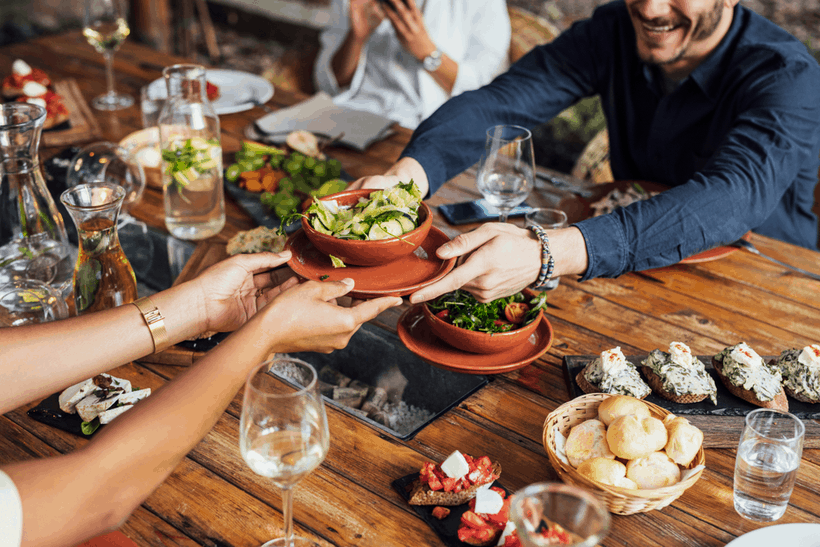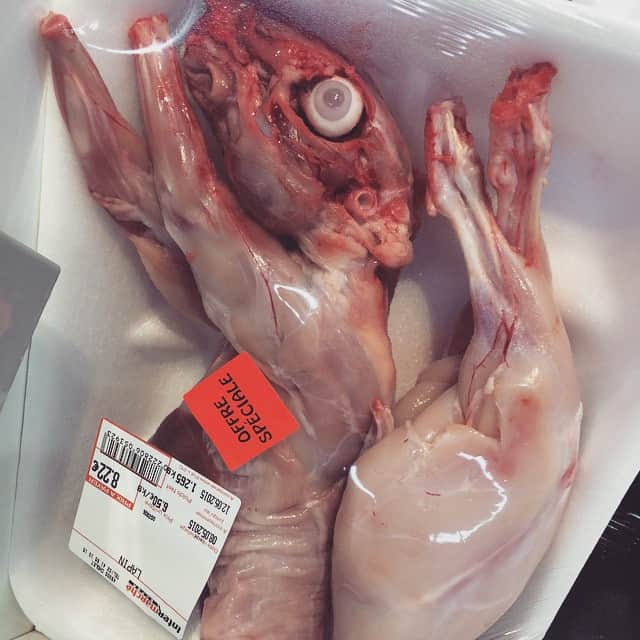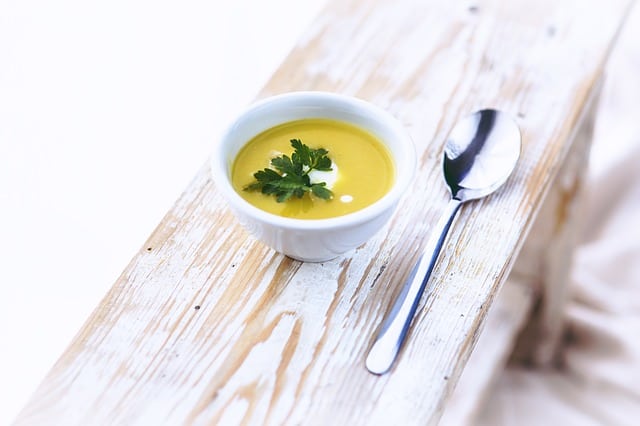Bonjour, tout le monde! I have a guest post for you today coming from Catherine, an English woman I’ve known for a couple of years now who originally came to work in France for a summer in 2015 and ended up staying a little longer than planned! She met her husband in France and six years later it seems she can’t stay away. Catherine and her husband spend their time between France and the UK and currently live in the spectacularly beautiful Cote d’Azur. She works online as a Nutrition & Lifestyle Coach, helping women to ditch diets and reclaim their energy.
What follows are her words about what it’s been like as a vegetarian and vegan in France. Let’s get into it…
Vegetarian & vegan in France: 5 Things I’ve learned

Credit: www.Shutterstock.com/Natalia Hanin
Is it hard to be vegetarian or vegan in France? Well, France isn’t exactly well known for being vegetarian friendly. There’s a reason for that. I’ve been working here for the past six years as a vegetarian, more recently as a vegan in France, and to say it’s been a challenge is a bit of an understatement. Things have improved in recent years, but it’s still not as easy to be vegetarian in France as it is in the UK.
Let’s get into five things being vegan and vegetarian in France has taught me about the country and some tips to help you get by if you’re plant based. If you’re planning to travel to France and are concerned about what you’ll be able to eat while you’re here, I hope this helps shed some light on vegetarianism in France.
1. French cuisine
French cuisine is a beautiful thing and while meat and fish often takes center stage, there are some exquisite vegetable dishes. Side dishes have frequently made up my entire meal, and in a good restaurant, the sides can be delightful.
Ratatouille, green beans, potato or broccoli gratin are all delicious vegetarian French foods and easy to whip up in the kitchen.
To a meat eater, these dishes may be overlooked, but not when they’re the main event. Learning how to turn simple ingredients into a work of art is something the French have truly mastered, and I think you appreciate this more as a vegetarian.
2. Cultural pride
The French are immensely proud of their culture and French cuisine is known worldwide for its quality.
Many French foods and wines are given the protected status of AOC (Appellation d’origine contrôlée) or AOP (l’appellation d’origine protégée) which classify a product as originating from a specific region and also refers to the quality, tradition and know-how of how a product is produced.
This includes some poultry and lamb. French dishes such as beef bourguignon, coq au vin and cassoulet may be dishes best avoided by vegetarians but are world famous and staples in French homes. The pride in French culture and cuisine is another reason why the uptake of vegetarianism in France is slow.

Credit: www.shutterstock.com/Yulia Grigoryeva
3. Tradition
In my first years living in France, I was lucky enough to live in the traditional village of Muides-sur-Loire. You’ll find everything you’d expect there including la boulangerie, la boucherie and la fromagerie. Whilst I personally never went in the butcher shop, it was a joy to see families on an evening walk to collect their locally produced food.
In rural areas, lunchtime is still sacred. This is a time to take a break, eat a good meal and socialize. Meat or fish is usually a part of this meal. I think the element of tradition is another part of why vegetarianism is slow to take off in France. The link between food, family, and tradition is fierce and that generally includes meat, which leads me to…
4. Meat is a way of life
In a French supermarket, you’ll see many parts of the animal being sold as meat that you wouldn’t see in the UK, such as hooves and heart. Restaurants serving frogs legs, foie gras, tongue and steak tartare (a beef dish eaten raw) are more common than you’d expect.
Recently the mayor of Lyon tried to take meat off school menus. It was met with protests and described as an “unacceptable slur” to French farmers and butchers by a French Minister.
Hopefully this gives you an idea of how meat is viewed in French culture. This is obviously changing, but is part of the reason it’s changing at a slower rate in France compared to other countries.
5. It’s normal to speak up
A French restaurant owner once told me she found English people perplexing. When asked, “Is everything okay with your meal?” they always say yes, then sometimes leave negative reviews on Trip Advisor. She didn’t think French people would do that. Given the chance to provide honest feedback on a meal, they would do so. This gives her chance to correct any mistakes, meaning her guests leave as happy customers.
Use this to your advantage. Ask for exactly what you want, whether it’s amending a dish on the menu to meet your needs or a couple of starters instead of a main meal. If you’re not happy, say so, politely of course. Restaurant staff may not understand your reasons for not eating animal products, but they absolutely understand the importance of providing outstanding service.
Wow your French dining companion with my restaurant etiquette tips >>
So being vegetarian or vegan in France is a challenge, but it’s not all bad. It’s also taught me a lot and helped me to grow in other ways.

Credit: www.shutterstock.com/ Foxys Forest Manufacture
Here are 5 things I’ve learned from being vegetarian in France:
1. Communicate clearly
During one of my first dates with my then boyfriend (now husband) I told the waitress I was vegetarian. She offered me a salmon pasta dish. My French wasn’t up to speed back then and because I didn’t hear everything she said, I accepted her idea of French vegetarian food.
Luckily, my husband was paying attention and interjected. I ended up having pasta and ratatouille, again, but it’s better than a fish dish. I find it easier to ask, “Do you have any dishes without meat or fish?” rather than saying I’m vegetarian.
That way you’ll avoid any confusion. Of course, this is more relevant in small towns and rural areas. It doesn’t necessarily apply in big cities where you may be lucky enough to find vegetarian and vegan dishes on the menu.
2. Ask in advance
One of the best ways to avoid a disappointing experience at a French restaurant is to let them know your dietary requirements in advance. It takes a little more planning and organization, but it’s worth the extra effort. I did this at the Auberge du Bon Terroir in Muides-sur-Loire.
The chef and restaurant owner hadn’t created a meat-free dish in her restaurant before and she absolutely rose to the challenge for vegans in France. She created two courses using only produce from her garden and was as thrilled as I was with the results.
If a French chef can serve you a delicious meal, they will. It’s just easier if they have a little warning.

Credit: www.shutterstock.com/Milles Studio
3. Get creative in the kitchen
While French supermarkets are getting better in terms of the range of vegetarian and vegan products they sell, you probably won’t find a whole aisle or section devoted to “free from” products as you would in the UK. In smaller towns, you’ll find a good range of veggie or vegan burgers, maybe even some falafel, but not too much more.
This is actually fantastic news because it forces you to get a little creative and create fantastic meals from scratch. Of course, it’s a little more effort but the taste usually makes up for it.
*To make sure your supermarket buys are vegan or vegetarian keep an eye out for EVE vegan or V-Label on the packaging.
4. Eat more plants
Before I moved to France, I ate a lot of Quorn and processed meat substitutes. They’re more widely available now, but when I first moved here, they weren’t at all. Of course, protein is essential in our diets but eggs and cheese get a little boring after a while. Never mind the lack of variety!
So, I started introducing beans, lentils, tofu and more nuts and seeds into my vegetarian diet. I started to shift my focus from being vegetarian in France for the animals and became more aware of the health benefits.
I’ve always been a little health conscious, but these changes really piqued my interest and I eventually went on to study nutrition.
Top tips for NOT embarrassing yourself at the French farmers’ market >>
5. Be flexible
You might have to accept that the vegetarian meals you eat in French restaurants may not be the most balanced meal you’ve ever eaten. You’ll probably end up with a very carb-heavy meal, but once in a while this won’t make much difference.
Repetition is very likely too. I’ve had goat’s cheese salad as my main meal so many times I’ve lost count.
For me, a huge part of eating out is the social element. It’s an occasion and the chance to catch up with family and friends. So, I focus on that side of it and go with the flow even if vegetarian food in France isn’t exactly what I’d hoped for.

Credit: www.shutterstock.com/LStockStudio
Hopefully the tips above will help you to navigate the vegetarian and vegan in France scene a little easier or at the very least provide some relief that you’re not the only one finding it frustrating.
As with everything in life, our attitude and the approach we take affects our experience, so focus on the positives and enjoy your time in this beautiful country as much as you can.
***
Thanks so much, Catherine! Show her some love in the comments below and let me know how being vegetarian or vegan in France has been for you. You can visit Catherine’s site here and and follow her on Instagram here @catherinedeancoaching.
Here’s where to buy vegetarian food in France:
Biocoop: “Bio” means organic (short for biologique). This specialty health food store is kind of like a much smaller Whole Foods. You’ll find all kinds of vegan and vegetarian-friendly products. The popular chain has over 700 locations in France.
Naturalia: This health food store is also popular with about 200 locations is and known for its natural and and vegan products in France.
La Vie Claire: Founded in the 1940s, this modern chain has about 350 stores nationwide and is sponsored by the French cycling team of the same name.
For French food in the U.S., check out this amazing online French grocery store (and don’t forget to use my discount code!).
PIN my vegetarian and vegan in France post:
Featured image credit: www.shutterstock.com/Letterberry






Excellent advice. I lived in France 12 years ago and I had lived there for 5 years. To say I was vegetarian they thought I was crazy so I’m glad to hear that things are slowly changing. A good idea to warn the chef in advance, something I would never have thought of
Thanks Diane & Catherine!
As a vegan at home & when I can when traveling, although usually have to resort to vegetarian, those were very helpful tips, especially about not using the term vegetarian. I’ve met folks here in the states who claim to be vegetarians & still eat fish, so go figure.
When I travel, I do usually just go to local grocers & get produce & make salads adding seeds, nuts, tofu, especially if I’m staying at a suite with a kitchen. Once, I stayed at a b&b & they suggested I bring my tofu & refrig items & they’d store for me. So, kinda cool there.
Eating fresh & raw is my standard, especially in summer & I bet at restaurants in France that isn’t as common, but as Diane has shared with her farmer’s market vlog, at least there are places in summer that sell a great variety.
Thanks again!
Q
I totally get what you’re saying, I’ve actually heard people saying they’re vegetarian but they still eat chicken!! What’s up with that?
Some very good points here. Veggie for 43 years I still say I’m vegetarian and get asked if I eat fish or chicken “no, I’m vegetarian”. I think some people think it’s a cool fad (rather than lifestyle) they want to be part of but can’t really do without animal flesh or easy protein – veggies and vegans have to work hard for their proteins. Then there’s explaining that vegetarian food that’s been cooked in oils that have had meat or fish in are no longer vegetarian. That point wasn’t covered in this piece.
Very thought provoking article though thank you.
I’m a vegetarian who occasionally eats shrimp and salmon. I have recently traveled with tour groups in Spain, the Balkans and Costa Rica. I’ve learned the hard way not to ask for a vegetarian meal at a restaurant. So many times I have been served an entire plate of beans or risotto. Now I say that I eat vegetables, bread and salad. Some of the best meals I’ve had were in Costa Rica where I was served a plate of rice, potatoes, beans, salad, plantain, salsa and fruit.